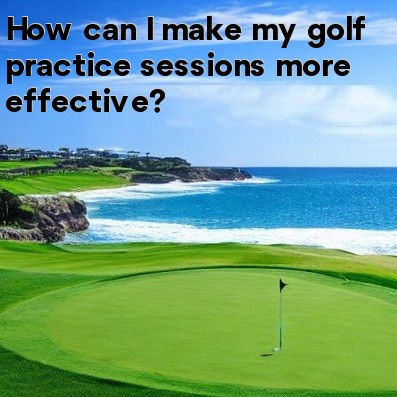
In golf, How can I make my golf practice sessions more effective?
Practicing regularly is crucial for golfers who are looking to improve their game. However, simply hitting balls on the driving range without a plan or purpose may not yield the desired results. To make your golf practice sessions more effective, consider incorporating the following strategies:
- Set specific goals: Before starting your practice session, determine what aspect of your game you want to work on. It could be improving your putting, driving accuracy, or working on specific shot shapes. Setting clear goals will help you stay focused and track your progress.
- Create a routine: Developing a pre-shot routine and sticking to it during practice sessions can help simulate real on-course situations. This routine may include visualizing the shot, aligning your body, taking practice swings, and then executing the shot. By practicing with a routine, you can develop consistency and confidence in your game.
- Vary your practice drills: Engage in a variety of practice drills to challenge different aspects of your game. For example, you can set up targets on the driving range to improve your accuracy or work on your short game by practicing different chip and pitch shots. By incorporating different drills, you can simulate different golf situations and improve your overall game.
- Work on your mental game: Golf is as much a mental game as it is a physical one. Use your practice sessions as an opportunity to work on your mental approach to the game. Practice techniques such as visualization, positive self-talk, and managing pressure situations. Cultivating a strong mental game can greatly enhance your performance on the course.
- Practice golf-specific fitness: Golf requires a certain level of physical fitness and flexibility. Incorporate exercises and stretches into your practice sessions that target golf-specific muscles, such as your core and rotational muscles. Developing strength and flexibility can lead to improvements in your swing mechanics and overall performance.
- Track your progress: Keep a record of your practice sessions and note any improvements or areas that require further work. Tracking your progress can provide motivation and help you identify trends or patterns in your game. It can also guide your future practice sessions and highlight areas that may need additional attention.
- Simulate on-course scenarios: To make your practice sessions more game-like, try to simulate on-course scenarios. Create imaginary holes on the driving range and play them as you would on an actual course, incorporating different shots and club selections. This can help you transfer your practice skills more effectively to the course.
- Seek professional guidance: Consider working with a golf instructor or coach who can provide expert guidance and help you refine your technique. They can analyze your swing, provide personalized drills, and offer valuable feedback. A professional instructor can significantly accelerate your progress and ensure you are practicing effectively.
In conclusion, making your golf practice sessions more effective involves setting specific goals, creating a routine, varying your practice drills, working on your mental game, practicing golf-specific fitness, tracking your progress, simulating on-course scenarios, and seeking professional guidance. By incorporating these strategies into your practice routine, you can maximize your practice time and improve your overall golf game.





